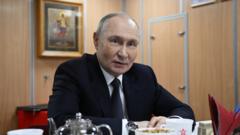As Ukraine and the United States navigate complex negotiations with Russia, the Kremlin appears to be leveraging its position to extract concessions, complicating prospects for peace.
**Russia Gains Upper Hand in Stalled Cease-Fire Negotiations**

**Russia Gains Upper Hand in Stalled Cease-Fire Negotiations**
Experts warn that Moscow's demands are strategically delaying progress in crucial talks amid a chaotic diplomatic environment.
The Black Sea remains a focal point in ongoing cease-fire discussions, where Ukraine believed it had reached a temporary agreement to halt hostilities. However, conflicting signals emerged when Russia insisted the lifting of economic sanctions against its agricultural bank, Rosselkhozbank, was a prerequisite for any truce. Discussions held in Saudi Arabia highlighted this standstill, leading analysts to conclude that Russia is adeptly buying time and negotiating from a position of strength.
The Trump administration is pushing for incremental cease-fire agreements, arguing these small steps could eventually lead to a more comprehensive peace. Nevertheless, these limited deals are largely seen as advantageous to Russia, allowing it to gain both concessions from Ukraine and favorable public perception in the U.S.
Just this Tuesday, Moscow announced that it would consider a cease-fire in the Black Sea contingent upon sanctions relief. Should Washington yield to these terms, the resulting agreement could heavily favor Russia over Kyiv. Recently brokered deals include a 30-day cease-fire in strikes against energy targets, but these have faced criticism due to the ongoing attacks each side alleges against the other.
Earlier this month, President Putin turned down a broader cease-fire proposal, instead proposing conditions that would handicap Ukraine in the event of renewed conflict—such as a freeze on recruitment and military assistance. The complex interplay of demands and responses in this evolving situation underscores the precarious balance of negotiations and the ongoing struggle for power between the involved nations.
The Trump administration is pushing for incremental cease-fire agreements, arguing these small steps could eventually lead to a more comprehensive peace. Nevertheless, these limited deals are largely seen as advantageous to Russia, allowing it to gain both concessions from Ukraine and favorable public perception in the U.S.
Just this Tuesday, Moscow announced that it would consider a cease-fire in the Black Sea contingent upon sanctions relief. Should Washington yield to these terms, the resulting agreement could heavily favor Russia over Kyiv. Recently brokered deals include a 30-day cease-fire in strikes against energy targets, but these have faced criticism due to the ongoing attacks each side alleges against the other.
Earlier this month, President Putin turned down a broader cease-fire proposal, instead proposing conditions that would handicap Ukraine in the event of renewed conflict—such as a freeze on recruitment and military assistance. The complex interplay of demands and responses in this evolving situation underscores the precarious balance of negotiations and the ongoing struggle for power between the involved nations.



















